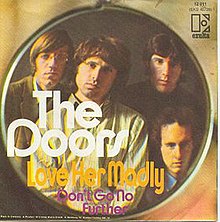| "Love Her Madly" | ||||
|---|---|---|---|---|
 | ||||
| Single by the Doors | ||||
| from the album L.A. Woman | ||||
| B-side | "(You Need Meat) Don't Go No Further" | |||
| Released | March 1971 | |||
| Recorded | December 1970 –January 1971 | |||
| Studio | The Doors' Workshop, Los Angeles | |||
| Genre | ||||
| Length |
| |||
| Label | Elektra | |||
| Songwriter(s) | The Doors [a] | |||
| Producer(s) |
| |||
| The Doors singles chronology | ||||
| ||||
"Love Her Madly" is a song by American rock band the Doors. It was released in March 1971 and was the first single from L.A. Woman , their final album with singer Jim Morrison. "Love Her Madly" became one of the highest-charting hits for the Doors; it peaked at number eleven on the Billboard Hot 100 singles chart and reached number three in Canada. Session musician Jerry Scheff played bass guitar on the song. [3]
Contents
Cash Box described the song as being "a precision combination of FM and top forty potentials." [4] Record World called it a "terrific new rocker." [5]
In 2000, Robby Krieger, Ray Manzarek and drummer John Densmore recorded a new version of "Love Her Madly" with Bo Diddley for the Doors tribute album Stoned Immaculate .